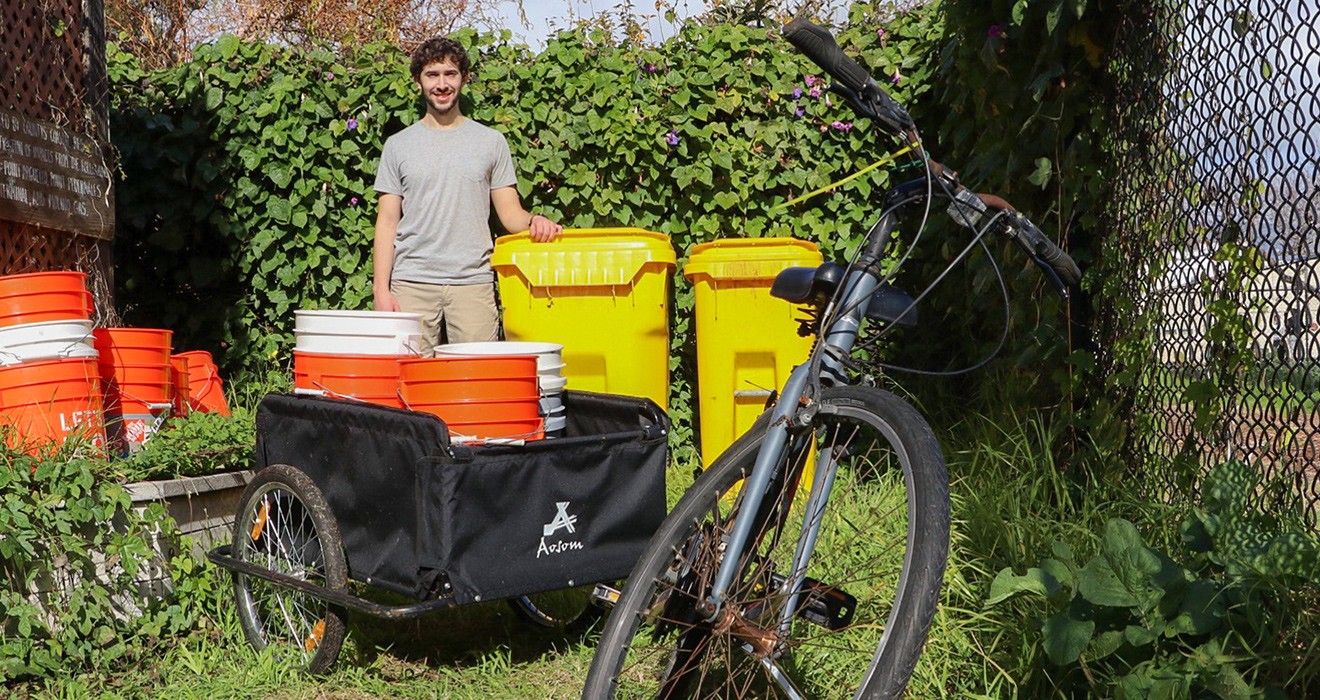
01.07.19
Activist Spotlight: Jacob Bider with the Isla Vista Chapter's Ocean Friendly Gardens Program
By Surfrider Foundation1. Why and when did you get involved with the Surfrider Foundation?
During my second year at UCSB, I chose to involve myself with the Surfrider Foundation for a variety of reasons. One of the main reasons I got involved was because I noticed that many students in Isla Vista did not have the opportunity to compost their food waste from home, and I felt that Surfrider would be an appropriate platform to help me solve this problem. When I saw that Isla Vista (IV) Surfrider was hiring Ocean Friendly Garden Interns, I applied knowing that the OFG team would be the ideal group to work with on a compost program. At one of our first meetings I proposed that we create a compost program for Isla Vista. Everyone was ecstatic about the idea, and so began the Isla Vista Surfrider Compost Collective.
2. What are some local issues that are affecting your ocean, waves and beaches?
Isla Vista is one of the most densely populated coastal communities in the country, causing it to have a large environmental impact on the ocean, waves, and beaches. With a population density of almost 15,000 people per square mile, one particular issue that Isla Vista faces is large amounts of trash entering the ocean. Luckily, the Isla Vista Recreation and Park District has created an effective program called Adopt a Block, that provides students with community service hours for picking up trash off the streets of Isla Vista. IV Surfrider also hosts beach cleanups, where students and members of the community get together to remove debris from the beaches of Isla Vista. Through programs like these, Isla Vista’s environmental impact is largely decreased.
3. What Surfrider projects have you worked on?
The majority of my time at Surfrider has been spent on creating a resilient compost program for the community of Isla Vista. Currently, the IV Surfrider Compost Collective provides households with five-gallon buckets and composting guidelines. After a week of composting, workers bike to their designated households with a cargo trailer attached to their bike to pick up the buckets. After picking up their household buckets, workers bike to a local community garden where they sort through the food waste, note what was composted incorrectly, weigh the food waste, then dump it in compost bins donated by the county’s waste management company. Buckets are then cleaned and returned to their households. After this process is completed, workers send out group messages to the households they pick up from, which detail the amount of food waste composted and if any materials were composted incorrectly. Typically, after a few weeks of utilizing this feedback system, we see a positive increase in households composting practices. Read more about this great new program here.

While the IV Surfrider Compost Collective has been my main focus at Surfrider, I have also had the chance to develop a cigarette butt pick up program by collaborating with another organization I founded, UCSB Greeks Go Green. The goal of Greeks Go Green is to foster a more sustainable lifestyle for campus fraternities and sororities and the local community in Isla Vista. Utilizing my relationship with IV Surfrider, I launched a cigarette butt pick up program within Greek life with the help of my chapter’s Rise Above Plastics program. Through UCSB Greeks Go Green, Greek members have recycled over 10,000 cigarette butts on campus thus far.
4. What has been the highlight of your Surfrider experience?
In order to implement the IV Surfrider Compost Collective on a much larger scale, my OFG team began to apply for grants, a process that was new for all of us. Because of our inexperience, my team had to rely on the assistance of other Surfrider members, such as our chapter president at the time, Benny Drescher. After multiple meetings with environmental community members and a few failed grant submissions, my team decided to apply for the Coastal Fund major grant, which was the largest we had applied for to date. Because we had applied for multiple grants beforehand, we were able to learn what worked and what did not, allowing us to craft our best compost program proposal yet. By the end of this process we had received close to $7000 in funding. While receiving this funding was an exciting part of my Surfrider experience, the true highlight was the many failures I experienced that led up to this success. Through failing multiple times, I learned a great amount more than I would have if I succeeded right away.
5. What is the most important thing you tell others about Surfrider?
Surfrider is a special organization because it brings together many like-minded and passionate people. When like-minded and passionate people are brought together, the ability to succeed is raised exponentially. If you are passionate about environmental stewardship, I would highly suggest involving yourself with Surfrider.
6. Why are you a Surfrider coastal defender?
When I was much younger, every summer I would attend a camp in the pristine coastal town of Bolinas, CA. This camp did not teach me about the importance of caring for the ocean and the surrounding environment, it simply showed me how beautiful they can be if they are left untouched. Through participating in activities such as hiking in the nearby forest of Muir Woods and surfing in the Pacific Ocean, I developed a deep passion for the environment at a young age. This passion has stayed with me throughout my development into an adult, which is why I can now say that I am a Surfrider coastal defender.

Find a Surfrider chapter near you at Surfrider.org/chapters or suppor Surfrider's volunteer coastal defenders at Surfrider.org/support-surfrider!
